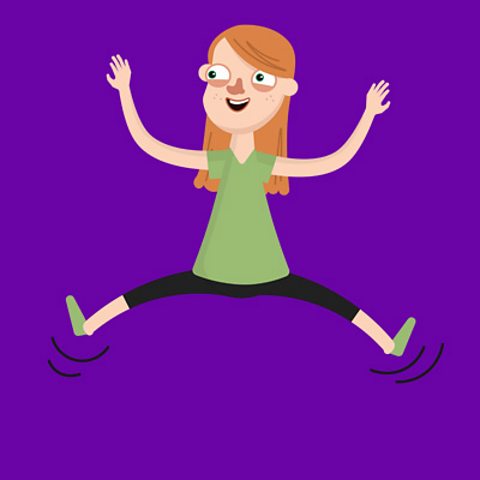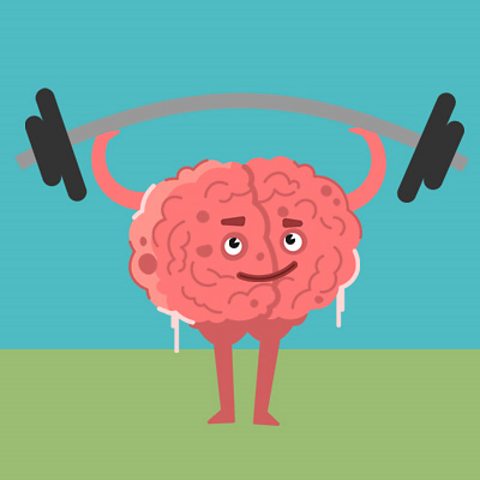In this investigation
We know exercising is good for keeping our body healthy, but can it change how we feel or how well we can concentrate in class? That's what we're going to be discovering in this investigation!
WeÔÇÖll develop our investigative skills and gather evidence through doing things and taking note of what happens.
Introduction to the Exercise Investigation
We asked Dr Chris and Dr Xand van Tulleken to help us investigate if exercise really can affect our brains as well as our bodies. Watch this short film to find out what they learnt and how they did it!
Dr Chris and Dr Xand van Tulleken investigate Exercise
Xand van Tulleken:
Everyone knows exercise is good for you, right?
Chris van Tulleken:
What if I don't wanna do exercise?
Xand van Tulleken:
Jog!
Chris van Tulleken:
Drive.
Xand van Tulleken:
Stairs?
Chris van Tulleken:
Escalators.
Xand van Tulleken:
Get some exercise!
Chris van Tulleken:
Relax and check out the lovely view.
Xand van Tulleken:
[GASPS]
Chris van Tulleken:
Nice of you to join me, Xand!
Xand van Tulleken:
Well this is a lovely view!
Xand van Tulleken:
Everyone knows that exercise makes you fitter and healthier. But did you know that exercise could also help you think, or improve your mood?
Chris van Tulleken:
Well today we are going to investigate the effect of exercise on the most important organ of all. That's right, the organ that makes you you.
Xand van Tulleken:
My nose. I think it's regal appearance gives me an air of authority.
Chris van Tulleken:
Not your nose, Xand, your brain!
Xand van Tulleken:
What? Aah [SCREAMS]!
Chris van Tulleken:
Our plan to investigate the effect of exercise on our brains is very simple.
Xand van Tulleken:
Earlier today, we did a test to measure how smart we are when we relax.
Chris van Tulleken:
We'll do the same test again after some exercise. Will anything have changed?
Xand van Tulleken:
As identical twins, our bodies are very similar to each other. So we can compare how small changes affect us.
Chris van Tulleken:
So today, one of us is going to do the exercise.
Chris van Tulleken:
And one of us isn't. Right Xand, heads or tails?
Xand van Tulleken:
Tails.
Chris van Tulleken:
Tails it is!
Xand van Tulleken:
Yes!
Chris van Tulleken:
Now that means that today, you get to do all the exercise while I have to put my feet up and relax.
Xand van Tulleken:
The one who wins has to do all the work?
Chris van Tulleken:
That's right. And I'll see you at the gherkin.
Xand van Tulleken:
The Gherkin?
Chris van Tulleken:
Tall glass building over there, looks like a gherkin. There's your bike helmet, and hi-vis jacket!
Xand van Tulleken:
But Chris, it's miles away!
Chris van Tulleken:
And that's why I'm getting the tube!
Xand van Tulleken:
What?
Chris van Tulleken:
Now it may look like I'm cheating, but what I'm doing is super important, as I'm what scientists call the control.
Chris van Tulleken:
Now the job of the control is to remain the same throughout an experiment, so that any differences in our results at the end of the test can be put down to the variable.
Xand van Tulleken:
And today, that variable is me, the one doing the exercise!
Xand van Tulleken:
Already I'm breathing more deeply and my heart is beating faster. That's so that my lungs can get more oxygen into my blood, and my heart can pump that blood around my body. So this exercise is giving my circulatory system a really good workout.
Chris van Tulleken:
Talking of circulatory systems, I'm sitting inside a giant one right now.
Chris van Tulleken:
The London underground moves over a billion people a year around this vast city, and the map is world famous.
Chris van Tulleken:
Hidden tubes moving everything around, a lot like the circulatory system of your body. The tubes are thousands of tiny blood vessels, and instead of trains, there are trillions of red blood cells, carrying oxygen as passengers. And one organ that's hungry for oxygen is the brain. It makes up just two percent of the body's weight, but uses around 20 percent of the oxygen youbreathe. The brain uses oxygen to break down sugars and produce energy. Oxygen powers your thoughts.
Chris van Tulleken:
[SIGHS] I wonder how Xand and his circulatory system are getting on.
Xand van Tulleken:
It's not just more oxygen that gets to your brain when you exercise. Your body releases soothing chemicals and you actually start to feel happier. I do feel happier, I feel great, I feel happy!
Chris van Tulleken:
And I feel, being the control is harder than I thought.
Xand van Tulleken:
There's time for a quick scientific detour.
Xand van Tulleken:
Here at Barts Pathology Museum, there are artefacts from the earliest days of scientific investigation, and these are actual human brains, the most complex and mysterious organ in the human body.
Xand van Tulleken:
Now just like a supercomputer, your brain needs lots of power. So it's no wonder that it grabs as much oxygen as possible.
Xand van Tulleken:
Scientists have taken scans of the brain during exercise, that show increased levels of electrical activity.
Xand van Tulleken:
Our investigation today should show that rather than tiring you out, a little exercise actually wakes your brain up a bit.
Xand van Tulleken:
I said "wakes your brain up a bit!"
Chris van Tulleken:
What? Not doing anything often makes you feel sluggish and sleepy. This is my stop!
Xand van Tulleken:
At last, our goal, the skyscraper known as the Gherkin, 118 metres of glass and steel.
Chris van Tulleken:
Oh, there you are, what took you so long?
Xand van Tulleken:
That, Chris, is what you call controlled moderate exercise. There was no place for competition in an experiment.
Xand van Tulleken:
If the scientist theory is correct, my leisurely cycle should already have made me smarter and happier.
Chris van Tulleken:
While I should be pretty much the same as before.
Xand van Tulleken:
How did you do?
Chris van Tulleken:
Well, my memory span actually got a bit worse.
Xand van Tulleken:
Mine got better!
Chris van Tulleken:
My reaction time got slower by a couple of hundred milliseconds.
Xand van Tulleken:
Well mine's faster! This calls for a celebration, for me at least!
Chris van Tulleken:
Not so fast, Xand, because there's one more thing I want to check, and that is the effect of maximal effort. Really working up a sweat, in your case by running to the top of that! Now here are your trainers. I'm gonna get the lift because I'm of course the control!
Xand van Tulleken:
But, but Chris, that's massive! Chris?
Chris van Tulleken:
For this investigation, we really need to get the blood pumping around Xand's body and into his brain. 32 floors should do the trick.
Xand van Tulleken:
So my heart is really beating hard now. That means more blood and more oxygen to important organs like my muscles and of course my brain. My body has been storing sugar in the form of glycogen for this very moment. Now it's being released for extra energy and that's waking up my brain as well.
Xand van Tulleken:
Floor 29, I hope this is all worth it!
Recorded voice (lift):
32nd floor.
Chris van Tulleken:
Oh, my ears have just popped, I hope Xand releases how much I'm suffering for science!
Xand van Tulleken:
Yes!
Chris van Tulleken:
Well done, big brother. That was definitely maximal effort. Let's see how it affected your brain.
Xand van Tulleken:
[GASPS]
Chris van Tulleken (unsure):
If scientists are correct, the effect of exercise on your brain isn't just short-term. The extra oxygen could help brain cells grow in the parts of your brain that control words, memory and learning.
Chris van Tulleken:
Well Xand, the maximal effort results are in. And I haven't really changed because I haven't really done anything. But you, on the other hand.
Xand van Tulleken:
Well come on, don't keep me in suspense!
Chris van Tulleken:
Well, your memory has got a tiny bit worse than it was at the bottom of the stairs, but your reaction speed has got even quicker!
Xand van Tulleken:
Wow! So I am tired at the end of doing all that, and yet I've actually got better at something!
Chris van Tulleken:
Success! Our small-scale sample of two appears to show that exercise does indeed improve your brain.
Xand van Tulleken:
But to really investigate a theory, scientists have to perform an experiment hundreds, maybe thousands of times.
Chris van Tulleken:
And that's where you lot come in. Out there, and in there!
Xand van Tulleken:
Hello.
Chris van Tulleken:
We need you to do your very own controlled version of this investigation.
Xand van Tulleken:
So get investigating.
Chris van Tulleken:
Yeah, what are you waiting for? Get on with it.
Xand van Tulleken:
Go on, get investigating, come on!..What are you waiting for?
What will we be doing?
To see if exercise affects you:
You'll do online mood and concentration tests and quizzes before and after exercise so you can compare your results to see if youÔÇÖve changed! YouÔÇÖll test three different types of exercise. To make sure it is a fair test, you'll test each type of exercise on a different day.
Each day you will:
Log on to the website to do the online tests.
Go outside and do one of three possible exercise activities
Come back in to the classroom and repeat the online tests.
IMPORTANT!
It's important to do all three of the activities once ÔÇô donÔÇÖt miss any out! Remember to do each exercise on a different day ÔÇô donÔÇÖt try to do more than one a day! And don't forget to go outside to do the exercises!
How to do the Exercise investigation
These step-by-step films explain how to carry out the Exercise investigation at your school.
1. Watch this introduction video first.
Introduction film
NARRATOR:
MaleFor this investigation, you will need paper-based tests, stopwatch, audio equipment, distance-measuring equipment, tape, chalk or playground cone markers and recording sheets for the bleep test. To carry out the paper-based tests, please see the teacher resource and student worksheetsNecessary audio files are available for download from the Terrific Scientific website. Thisexercise investigation consists of three physical activities. Each activity must be completed on a different day. Other than that, you're free to choose the order and on which days the activities are performed. On each day, you'll complete paper-based memory and attention tasks, plus mood questions before and after physical activity. These are paper-based tasksOnce thepaper-based tasks have been completed by all pupils, you should immediately carry out one of the three physical activities. All activities must take place during lesson time and outside. The investigation cannot be done in the school hall. If you carry out the activities indoors, the results are invalid. Each activity must be completed on a different day. You're free to choose theorder and on which days you do the activity. Now scroll down and click on one of the three links to find out how to perform today's chosen physical activity.
2. This film explains how to complete task 1.
How to do task 1
NARRATOR:
Activity One. This is a 15 minute walk or run outside. You do not need to change into your PE kit. Before you go outside, you must complete the paper-based questions and tasks. This should take around 15 minutes. Choose an appropriate start line and gather round it. Once everyone is ready, off you go.
Woman in spotted dress:
Three, two, one, go!
NARRATOR:
Your teacher should use a stopwatch to measure 15 minutes. This is not a race or a competition. It is meant to be fun. You're free to run, walk or do a combination of both. However, you should run if you can. Once the 15 minutes are up, your teacher will tell you to stop, but you are allowed to finish the lap you're on.
Woman in spotted dress:
15 minutes, finish the lap that you're on!
NARRATOR:
Once everyone has finished, return to the classroom to complete the paper-based questions and tasks again immediately.
3. This film explains how to complete the bleep test.
How to do the bleep test
NARRATOR:
Activity two. This is a shuttle run commonly known as the bleep test, and should be done outside. Before you go outside, you must complete the paper-based questions and tasks. This should take around 15 minutes. The whole class can carry out this activity at the same time by splitting into pairs. Each pair has one recorder and one runner. Create the running area on a suitableflat surface. Avoid lumps and bumps, puddles and trip hazards where possible. First you need to mark a start line. Lines can be made with tape, chalk or with cones. Next, mark the length of the course. It needs to be a straight run of exactly 20 metres. Each 20 metre run is called a shuttle. A shuttle must be straight and cannot be split into two ten-metre runs. Markanother line at 20 metres, parallel to the start line. Lines should be long enough for all the runners to stand on comfortably, side-by-side. The recorder stands at one end of the course with a clear view of the runner. Make sure the recorder has a recording sheet and a pen to mark the scores. Your teacher will start the bleep test audio to begin the test. This audio can be downloadedfrom the website. The runners should run continuously back and forth between the two lines in time with the bleeps. Each single length counts as one complete 20 metre shuttle. The runners should aim to reach the target line at the bleep, not before or after. The recorder should make sure the runner reaches the line and isn't cheating or rushing. This is not a race andthere are no winners or losers. It's also important to remember that this investigation isn't about running as fast as you can. It's about endurance. As the test progresses, the intervals between the bleeps decreases, forcing the runner to increase their speed to keep up. Moving up a speed level is marked by this sound. Continue running when you hear it. If the line is reached beforethe bleep, the runner must not start to run for the other line until after the bleep sounds. The runner continues with the test until they can't reach the target line in two consecutive tries before the bleep sounds. The last successfully completed shuttle is the one recorded. You should take a short break to catch your breath, and then the runners and recorders swap rolesand repeat the testAs soon as the whole class has finished the bleep test, complete the paper-based questions and tasks again immediately.
4. This film explains how to complete the control activity.
How to do the control activity
NARRATOR:
Activity three. The control. This is to test how your brain performs when there is no physical activity at all. Before you go outside, you must complete the paper-based questions and tasks. This should take around 15 minutes. For this activity, you must go outside and relax by sitting or standing for 15 minutes. You're allowed to talk and chat but there must be no physical activityso no playing games or even reading. Once the 15 minutes is over, return to the classroom to immediately complete the paper-based questions and tasks again.
Once youÔÇÖre finished
You can analyse your results to see if you can see any patterns and relationships between the data and the activities youÔÇÖve done. Did exercise have an effect on you?


